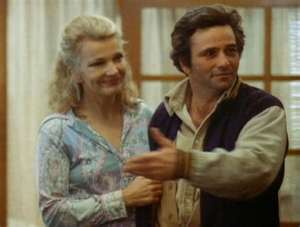A WOMAN UNDER THE INFLUENCE (1976 review)
From Monthly Film Bulletin, Vol. 43, No. 504, January 1976. As with some of my other reviews from this magazine reproduced on this site, the credits and synopsis are omitted.– J.R.
Woman Under the Influence, A
U.S.A., 1974
Director: John Cassavetes
Beginning with Shadows, the films of John Cassavetes have been at once limited and defined by their anti-intellectual form of humanism, an unconditional acceptance of the social norms of his characters that exalts emotion and intuition over analysis and, in narrative terms, looseness and approximation over precision. Used as an instrument for delivering a thesis (as in Faces) and/or allowing actors to indulge themselves in fun and games (as in Husbands), it is a style which characteristically operates like a bludgeon, obscuring at least as much as it illuminates while confidently hammering home its proud discoveries. But when it serves as a means for exploration, as in Shadows or A Woman Under the Influence –- however halting or incomplete a method it may be for serving that function — it deserves to be treated with greater credence. Read more

